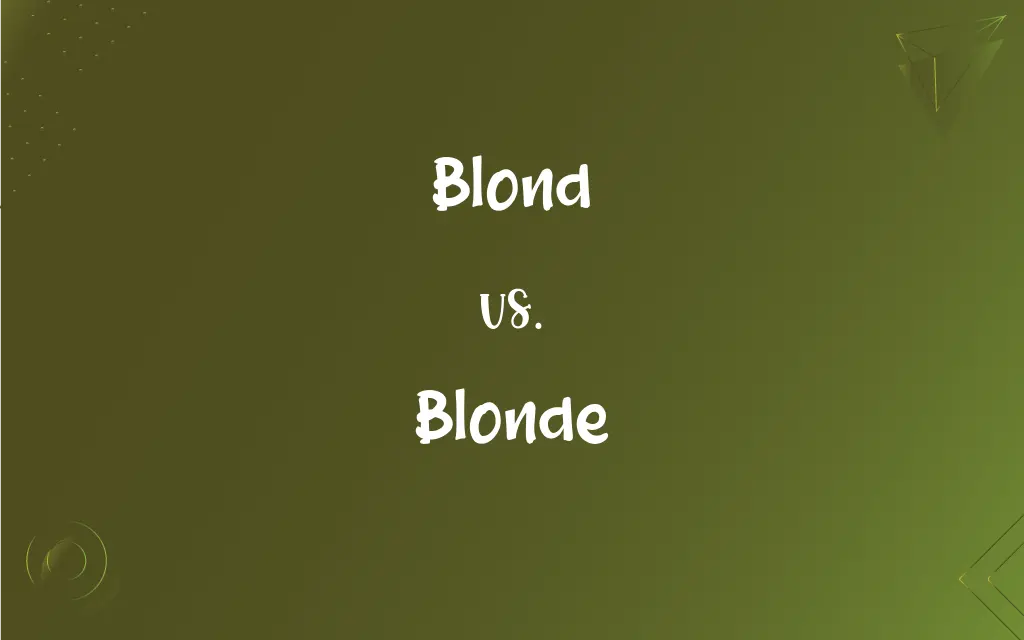Blond vs. Blonde: What's the Difference?
Edited by Aimie Carlson || By Harlon Moss || Updated on October 20, 2023
"Blond" can refer to a light hair color for both genders, while "blonde" typically denotes a female with light-colored hair.

Key Differences
The terms "blond" and "blonde" are often used interchangeably, yet they hold distinct grammatical nuances. Originating from French language conventions, "blonde" is generally used to describe a female with light-colored hair. On the other hand, "blond" is gender-neutral in English and can be used to describe any individual with light hair. Yet, when adhering strictly to its French origin, "blond" pertains to males.
Despite these distinctions, in American English, the distinction between "blond" and "blonde" has blurred, especially in informal contexts. "Blond" is now commonly accepted for both genders. However, for those meticulous about language, especially in formal writing, maintaining the distinction between "blond" and "blonde" can be of significance.
The choice between these words can sometimes reflect the writer's intent or the context's formality. For instance, fashion magazines or novels might adhere to the gender-specific distinctions more often. Still, in everyday conversation, one might hear "blond" used universally.
In essence, while "blond" and "blonde" emanate from gendered language norms, their contemporary use in American English has become more flexible. Recognizing the distinction, though, can enhance the precision and clarity of communication, especially in specific contexts.
Comparison Chart
Gender Association
Gender-neutral or male in traditional use
Female
ADVERTISEMENT
Language Origin
Derived from French
Derived from French
Common Use in U.S. English
Universally for any gender with light hair
Typically for females with light hair, but can vary
Describes
Light hair color, or sometimes light complexion
A female with light-colored hair
In Formal Writing
Often reserved for males or used universally
Used specifically for females
Blond and Blonde Definitions
Blond
Light-colored hair irrespective of gender.
Alex has a striking blond hair color.
ADVERTISEMENT
Blonde
Descriptive of characteristics typical of females with light hair.
Her blonde curls bounced as she walked.
Blond
A person, usually male, with light hair.
The blond stood out in the crowd.
Blonde
Pertaining to females with light shades of hair.
She has a classic blonde look.
Blond
Having features or characteristics of light tones.
She had a blond hue to her skin after her beach vacation.
Blonde
A female with light-colored hair.
The blonde was a well-known actress in the film industry.
Blond
A descriptor for objects with pale tones.
The blond ale is a favorite among patrons.
Blonde
A term denoting feminine associations with pale colors.
The blonde shade of the fabric was her favorite.
Blond
Pertaining to light shades in hair, complexion, or wood.
The room was adorned with blond wood furniture.
Blonde
In reference to objects or things reminiscent of light hair tones.
The coffee had a blonde roast.
Blond
Having fair hair and skin
Blond Scandinavians.
Blonde
Having fair hair and skin
Blond Scandinavians.
Blond
Of a flaxen or golden color or of any light shade of auburn or pale yellowish brown
Blond hair.
Blonde
Of a flaxen or golden color or of any light shade of auburn or pale yellowish brown
Blond hair.
FAQs
Can "blond" be used for both males and females?
Yes, in American English, "blond" is often used universally.
In which contexts is it crucial to differentiate between the two?
Formal writing, fashion magazines, or novels might often maintain the distinction.
Do other languages have gender-specific color terms?
Yes, many languages, like French and Spanish, have gendered adjectives.
Is there any difference in pronunciation?
Typically, no. Both are pronounced similarly in American English.
Do the terms have any connotations beyond color?
They can carry cultural or stereotypical connotations, but primarily they refer to hair color.
From which language did these terms originate?
Both "blond" and "blonde" have origins in the French language.
Which term is more commonly used in the U.S.?
"Blond" is more universally used in U.S. English.
Is using "blond" for females incorrect?
Not in contemporary American English, though traditional usage differentiates.
How do publications typically handle these terms?
Many follow style guides that might specify usage based on context.
Are there other hair color terms with gender distinctions?
"Blond" and "blonde" are unique in this regard in English.
How should one decide which term to use in writing?
Consider the audience, context, and whether gender distinction adds clarity.
Are these terms only used for natural hair colors?
No, they can describe dyed hair or even wigs.
Which term is gender-specific?
"Blonde" is typically gender-specific, referring to females.
Is "blond" always about hair color?
Primarily, but it can also refer to light shades like in wood or complexion.
Can "blonde" ever describe a male?
It's uncommon, but language is evolving, and contexts differ.
Is one term more prevalent in British English?
British English tends to maintain the gender distinction more than American English.
What's the safest bet if unsure about which term to use?
"Blond" is more universally accepted in American English for any gender.
Why do some people still differentiate between the terms?
Adherence to traditional language norms or to provide clarity in specific contexts.
Can "blonde" describe things other than hair?
Yes, it can be used descriptively, like "blonde roast" in coffee.
Which term appears more in literature?
It varies based on the context and the writer's preference.
About Author
Written by
Harlon MossHarlon is a seasoned quality moderator and accomplished content writer for Difference Wiki. An alumnus of the prestigious University of California, he earned his degree in Computer Science. Leveraging his academic background, Harlon brings a meticulous and informed perspective to his work, ensuring content accuracy and excellence.
Edited by
Aimie CarlsonAimie Carlson, holding a master's degree in English literature, is a fervent English language enthusiast. She lends her writing talents to Difference Wiki, a prominent website that specializes in comparisons, offering readers insightful analyses that both captivate and inform.































































